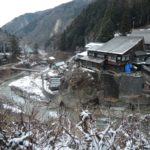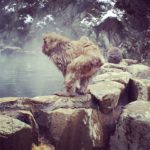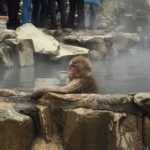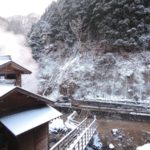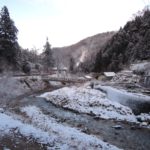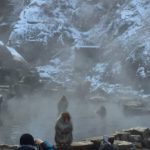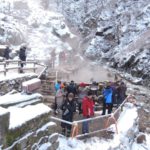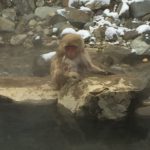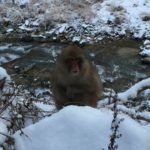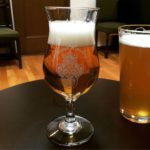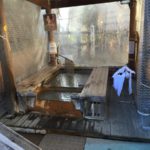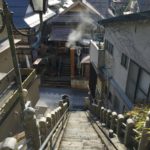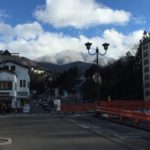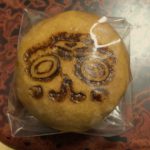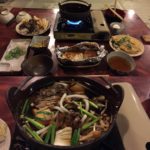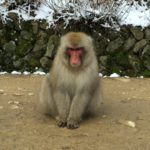猿 saru means “monkey.” 野猿 yaen means wild monkey, meaning the wild Japanese macaque.
After the New Year in January, I took a short trip to Yamanouchi (山ノ内) in Nagano prefecture (長野県) to see the snow monkeys at Jigokudani onsen 地獄谷温泉 (translation: hell valley hot springs) and yaen-kouen 野猿公苑 (wild monkey park). We stayed at the Korakukan Ryokan, literally right outside the monkey park, and obviously wild monkeys are a common site outside your window. It was pretty amazing.
The Korakukan ryokan is a bit “rustic,” to be polite, but despite the older facilities, the location and the food were absolutely amazing. Waking up to monkeys outside is just pretty darn cool. I will admit, the onsen themselves are only okay (but if you are very lucky a monkey might join you, so that is a bonus), and the facilities do take a bit to get used to (so do not come in with high expectations). It may not be the most comfortable place to stay in terms of amenities or luxury, but the experience is one I will never forget.
The first day, we landed in Tokyo and stayed the night, catching the early morning train over to Nagano, and continuing on to Yamanouchi (last stop was Yudanaka station). We stopped here and had Japanese soba for lunch. From there a bus will take you to a bus stop where many onsen resorts are located just outside the monkey park area, but the ryokan that is inside the monkey park area is a a decent hike through the snow (there is another road that gets you closer to the ryokan and park, but it closes during winter, so the bus stops at the area just outside by the beginning of the walking path). Yes, we could have stayed in a classier place, more facilities and luxuries, but all those places were much further from the monkey park than the Korakukan ryokan (which was literally at the monkey park). There is also a recommended area called Shibu onsen 渋温泉, which is an adorable onsen town that we explored one of the days during our stay, but alas, I was going for the monkeys. And since my number one reason for this trip was monkeys, as such the rustic ryokan was it. So definitely consider your priorities before booking this trip: do you want to be right by monkeys all the time (literally outside your window, in your baths, hanging out near the dining hall) or would you prefer convenience (to town, restaurants, or well… everything), nice facilities, small luxuries, more/fancier onsen, less trudging through snow/ice ?
We trudged through the light snow with our luggage (remember, pack light for this one). I would recommend a suitcase that you can carry like a backpack. And those traction things you can put over your shoes is a really good idea, there was quite a bit of ice in spots and especially useful for the downhill parts to not go skidding down on your bum. Luckily when we went there was only a bit of snow and the heavy winter storms had not hit yet (seriously, we missed some awful weather by just over a week), so it was not terrible. We arrived safely, got settled with our belongings, checked out our quaint facilities, and immediately headed to the park to see some monkeys before closing time!
Of course, this place is a happening tourist spot during the day time operating hours, and of course completely empty during closed hours. But I got to see some monkeys and observe them for awhile. They are so cute. But we did have to leave and went down to catch a bath and dinner at the ryokan.
The onsen bath was pretty scalding hot, and the faucet water pretty darn cold, so it was interesting to say the least. However, I got clean so I cannot complain too much. Plus there were some outdoor baths and you could glimpse some monkeys during twilight.
For dinner, nabe 鍋 (hotpot) was the main item for the meal, with several accompanying dishes. If you have never had nabe in the mountains of rural Japan during winter, you must try this! It was amazing. I had a vegetarian nabe, and my husbands was for omnivores. His also came with fried locust; he said they were crunchy and not too bad. With my yukata and coat (known as a hanten 袢纏) on, sitting at the table near the heaters drinking a beer and eating warm nabe with mountain vegetables, life was good. Plus a few monkeys ran down the hall outside the dining building.
The next day, we woke up early, grabbed an early morning bath (the guys bath was lucky and had monkeys join them) and checked out the monkey park before opening. Seriously, I could probably watch monkeys for the better part of a day. Over night it had snowed and so you could see monkey prints throughout the valley.
Afterwards, we headed towards town (through the snow path) and enjoyed touring about, as well as tasting beer at the Teppa Room, sake (nihonshu 日本酒), manjuu, and yet more onsen (a bit more upscale than our ryokan, so… ). There were some temples/shrines, and the town sites in Shibu onsen. When we returned for the day, we went back yet again to look at some monkeys before dinner time. The second dinner was another nabe with a little bit different variety. Again, it was an amazing meal. Throughout the day, I had chatted with various mainlanders about Okinawa, which seemed to interest them. Oh, and it snowed again overnight.
The last day we had to head out early after a quick bath, trudging back through the snowy path to town with our luggage. We trained back to Nagano where we stopped for a walk around and lunch before heading to the airport in Tokyo. I got some fresh apple juice and baked apple goodies; yum! I wanted to take a bag of apples back to Okinawa (apples are sort of expensive in Okinawa), but figured that was not really feasible. But I did pick up some other omiyage to take back home to friends and coworkers.I also got an amazake 甘酒 soft serve (yes in the middle of winter… but it was amazake flavor!). My husband tried a sake (nihonshu 日本酒) sampler . We really enjoyed our stop in Nagano, and realized that we should plan a separate trip just to visit Nagano properly.
Below are some images from the trip. Here is a link to the full album, in case you cannot get enough monkey pictures. I did not take any inside the ryokan, as at the time I figured it was too rustic.
